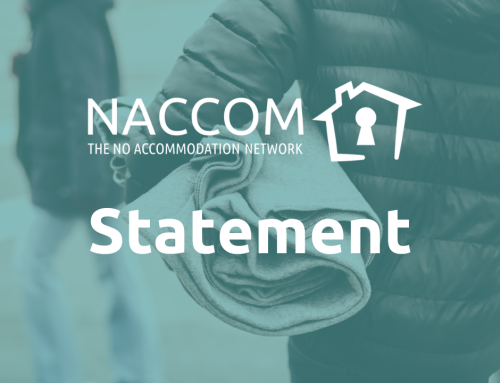New research published today by the charities Refugee Action and NACCOM, the No Accommodation Network, has revealed that vulnerable people refused asylum in the UK, including pregnant women and those with serious mental health conditions, are being failed by the Government’s asylum support system, leaving them homeless and unable to feed or clothe their families.
MISSING THE SAFETY NET, which features evidence from 200 asylum support applications to the Home Office from around the UK highlights that in some cases particularly vulnerable applicants are being made to wait for up to seven times the Government’s own recommended time limit for a decision on their application for support. Despite being legally entitled to support, long delays are forcing them into homelessness.
UK legislation requires the Government to support people refused asylum who are destitute and meet a narrow set of criteria, under Section 4(2) of the 1999 Immigration and Asylum Act. For example, if they are unable to return to their home country through no fault of their own, they are without official documentation, their country refuses to accept they are a citizen, or they are physically unable to travel, through illness or late-stage pregnancy.
In such cases, the Government’s own guidance states that it should provide support, which amounts to basic (often shared) accommodation and the equivalent of £35.39 per week – little more than £5 per day – via pre-paid cards that can only be used in certain shops. Home Office guidelines stipulate that support should be accessible to eligible applicants within 5 days, and for particularly vulnerable people within 2 days. Significant delays in receiving this vital lifeline are leaving families desperate and reliant on charity handouts, the report finds.
Key findings from the research, carried out between January and July 2019, include:
- On average, people waited 14 days for a decision on their asylum support application, with almost half (44%) of applicants waiting more than two weeks for a decision, with no other way of supporting themselves.
- This is seven times longer than the 2-day maximum that decisions should take for the most vulnerable applicants, and three times longer than the 5-day maximum that all decisions should take, according to Home Office guidelines.
- Some people had waited several months for a decision on their support, with one person waiting 124 days for their decision.
Weyneshet, who was six months pregnant when she applied for Section 4 support, recalls the impact of a five-month delay: “During that time I received no support. It was an extremely difficult time for me I had to go to so many places trying to find help. The only money I got was from the Red Cross, who were helping me by giving £10 a week. I was using the £10 to buy cheap food from a foodbank. It was such a difficult situation to be in, especially when I was pregnant. [I was] very tired… You want to just sit sometimes, you want to have a home where you can rest, eat well – but I didn’t have any of these things.”
Another applicant, Lina, was 40 weeks pregnant when she was evicted from her asylum accommodation, and only had her support reinstated when her new-born baby was three weeks old, despite her eligibility for Section 4 support.
She said: “My due date was 27 April, and the Home Office sent me a letter telling me remove myself from the house – when I looked at the date of the letter, it was dated 27 April. On my due date. I was pregnant, I was 40 weeks pregnant, when they sent me this letter. How could I remove myself from the house? I was heavily pregnant, where was I supposed to go, what was I supposed to do? I don’t know what the Home Office [was] thinking. They took away my support – can you believe it? I was 40 weeks pregnant – 40 weeks, 40 weeks! – and they took away my support. They only gave my support back a few weeks after I gave birth. After my baby was 3 weeks old, they started my support again.”
Stephen Hale, Chief Executive of Refugee Action, said, “This research proves that, yet again, the Home Office is failing to follow its own guidance for supporting vulnerable people. Asylum support is supposed to be a safety net. Right now it’s full of holes. Vulnerable people are being left with nothing while they wait for decisions. Slow and inconsistent decision-making by the Home Office is causing immense suffering among people that the system is supposed to protect.”
The charities recommend a clearer and more robust escalation process for the most vulnerable applicants, to mitigate unnecessary delays, and greater monitoring and accountability for the issues raised in the report.
Hazel Williams, National Director of NACCOM added, “The Home Office’s failure to provide the most basic of safety nets to people who are completely destitute, and to unnecessarily delay destitute pregnant women’s access to support, shows a total lack of humanity and is quite frankly dangerous. We’re calling on the Government to act urgently to review the current system, and at the very least follow its own published guidelines, to ensure people in urgent need of support are able to access it.”
The report also highlights other system failings, particularly where Home Office requests for further information (RFIs) in order to progress an application have led to longer, and in many cases unnecessary, delays. An analysis of 77 RFIs in the report shows that only 43% of RFIs were wholly necessary to determine an applicant’s legal entitlement to Section 4 support, with a quarter (25%) of cases found to have RFIs that were totally unnecessary, suggesting that the mechanism is not currently being used in the way it was intended and is directly contributing to further, avoidable, delays.
Moreover, of the 77 RFI cases analysed, there were a high number of applicants with severe mental health issues and/or risk of suicide who were without support and had cases which were not prioritised. In one instance, a medical letter was included to emphasise an applicant’s serious mental health issues to ensure a quick decision, and instead of prioritising the case the Home Office replied with an RFI asking about the mental health issues – despite this not being necessary for a decision on the individual’s eligibility for Section 4 support, resulting in a longer delay.
MISSING THE SAFETY NET – FULL REPORT.
[2] https://www.gov.uk/government/publications/asylum-support-section-42-policy




